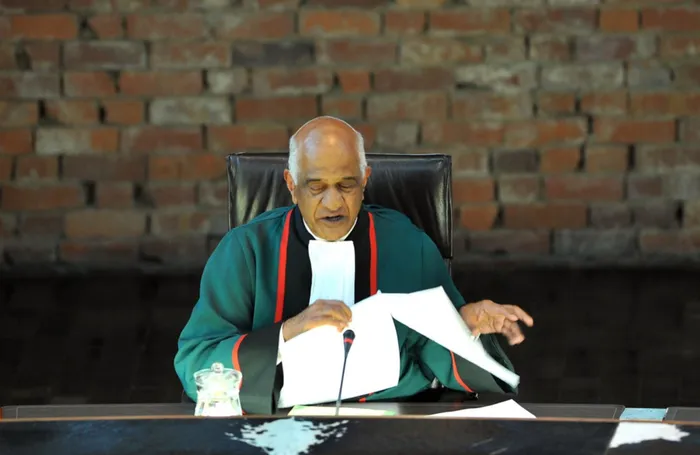Justice Yacoob’s ‘factional’ posturing dilutes judiciary’s integrity

Picture: Bongiwe Mchunu / Independent Newspapers / Taken October 5, 2012 – Justice Zak Yacoob’s activism raises concerns about his ability to remain unbiased in his recently revealed judicial advisory role, the writer says.
By Edmond Phiri
THE judiciary, by design, stands as a pillar of impartiality in a democracy mandated by the Constitution to adjudicate without bias, fear, favour or prejudice. The foundational principle, however, is tested when someone like retired Justice Zak Yacoob again serves in the judiciary, especially given his pronounced political stances.
The question that looms large is whether a judge, known for potent political affiliations and pronounced factional allegiances, can uphold the sacred principle of impartiality.
I think not!
The controversy surrounding Justice Yacoob’s role at the Constitutional Court surfaced two weeks after a Sunday World report, prompting the Office of the Chief Justice to clarify his duties.
Initially shrouded in secrecy, it was revealed that Justice Yacoob’s appointment was to assist in reviewing appeal cases before the court, a decision confirmed by the Office of the Chief Justice following inquiries by the Council for the Advancement of the South African Constitution and media outlets.
In the explanation, the Office of Chief Justice outlined Justice Yacoob’s role as providing “only a support service” to the court’s justices, to alleviate the “huge workload” resulting from the court’s expanded jurisdiction. This support entails Justice Yacoob drafting memorandums for new applications, which are then reviewed and possibly adopted or modified by the justices assigned to those cases.
Despite the clarifications, questions linger about the transparency and propriety of assigning such roles to retired justices when law clerks and researchers traditionally fulfil such roles.
Further complicating Justice Yacoob’s appointment are his factional political affiliation and public statements. His long-standing relationship with Minister Pravin Gordhan and vociferous participation in political movements, notably the #SaveSA campaign and his outspoken criticism of former president Jacob Zuma, paint a picture of a judge deeply entangled in political machinations.
Justice Yacoob’s activism also raises concerns about his ability to remain unbiased in his recently revealed judicial advisory role.
His vigorous public defence of Gordhan during the 2017 Sars Rogue Unit saga and his abrasive stance on the ANC’s factional battles reflect a judge who has steered far beyond the judiciary’s neutral confines into the turbulent waters of party politics.
In May 2021, a report in this paper’s sister title Sunday Independent exposed Justice Yacoob’s deep entanglement in the ANC’s internal conflicts. He was reported to have implored ANC stalwart Mathews Phosa to retract a legal opinion on an ANC matter.
Phosa recounted: “This man phoned me unexpectedly, hurling insults and demanding I retract what he termed a “s*** opinion” on the ANC’s step-aside rule.”
The step-aside rule, an ANC mechanism designed to sideline ANC leaders under criminal or corruption allegations, became a focal point of contention.
Justice Yacoob’s call to “retract the opinion” exposed his deep involvement in the ANC’s factional battles. The incident raises questions about the appropriateness of a retired Constitutional Court justice’s deep-seated involvement in party politics.
His political commentary further amplifies the depth of his involvement in the nation’s political discourse. In 2017, during the #SaveSA campaigns, he notably announced: “If Zuma resigns tomorrow, we have not won our struggle. We have had a small victory and nothing more. Our first objective, of course, is that Zuma must fall, but our president is not the solitary issue at hand … it follows that there is dirt on the hands of the majority of the NEC of the African National Congress.”
The statement again reveals Justice Yacoob’s involvement in the intraparty politics of the ANC, suggesting that more than removing a single figurehead would be necessary to cleanse the party of its entrenched challenges. This was not a judge speaking, but a politician.
The Sunday Independent report high-lighted a senior counsel’s allegation, preferring anonymity, that Justice Yacoob leveraged his close relations with Gordhan to exert influence and, at times, disparage others. The source depicted Justice Yacoob as a figure emboldened by political alliances, perceiving himself as beyond reproach due to these connections.
The crux of the matter lies in the responsibilities entrusted to Justice Yacoob by Chief Justice Raymond Zondo. Suppose Justice Yacoob were to review appeals submitted to the Constitutional Court. Would he be objective in handling cases involving individuals he might personally disagree with or those not aligned with Gordhan? The recent rejection of the Zuma appeal raises eyebrows over Justice Yacoob’s decision.
The judiciary has not been immune to criticism over its members’ public expressions of personal views. A notable instance is the Judicial Conduct Committee’s (JCC) action against former Chief Justice Mogoeng Mogoeng.
In March 2021, the JCC, led by Judge Phineas Mojapelo, found Justice Mogoeng guilty of contravening South African policy on Israel and of judicial misconduct for leveraging his position to further personal and external interests. The case illustrates the fine line judicial figures must navigate between personal expression and the ethical demands of their roles. It highlights the challenge of ensuring that the judiciary remains a bastion of impartiality and integrity.
The importance of Justice Yacoob’s role, whether as an impartial adviser or a politically influenced figure, becomes crucial in evaluating the integrity of the Constitutional Court’s appointment processes. His past statements and actions prompt a reassessment of how retired justices should engage with the judiciary, especially in advisory capacities that could influence the court’s decision-making.
The judiciary remains the guardian of fairness and justice. Ensuring that it remains free from perceived or actual biases is imperative. The appointment of Justice Yacoob, a man deeply involved in politics, to roles influencing judicial outcomes casts doubt around transparency, accountability and the unassailable need for impartiality in justice. The Constitutional Court needs to rethink Justice Yacoob’s appointment.
Phiri is an independent writer, commentator and analyst.